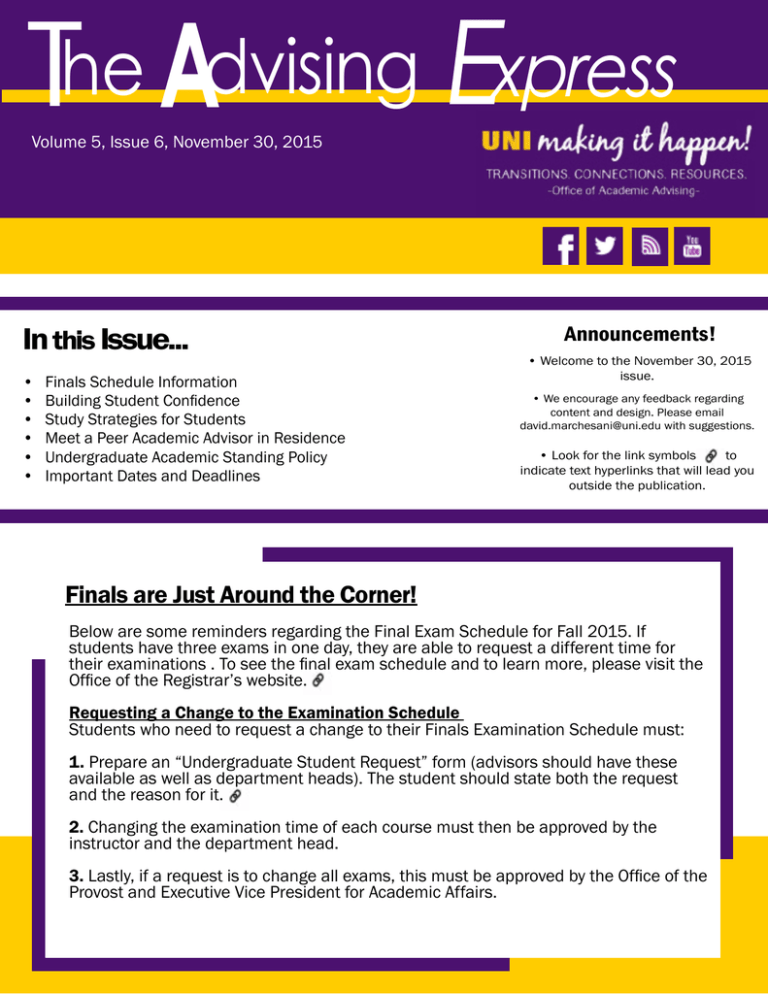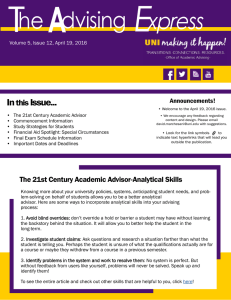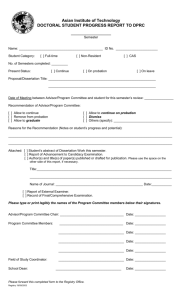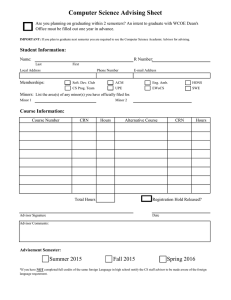A E dvising he
advertisement

The Advising Express Volume 5, Issue 6, November 30, 2015 In this Issue... • • • • • • Finals Schedule Information Building Student Confidence Study Strategies for Students Meet a Peer Academic Advisor in Residence Undergraduate Academic Standing Policy Important Dates and Deadlines Announcements! • Welcome to the November 30, 2015 issue. • We encourage any feedback regarding content and design. Please email david.marchesani@uni.edu with suggestions. • Look for the link symbols to indicate text hyperlinks that will lead you outside the publication. Finals are Just Around the Corner! Below are some reminders regarding the Final Exam Schedule for Fall 2015. If students have three exams in one day, they are able to request a different time for their examinations . To see the final exam schedule and to learn more, please visit the Office of the Registrar’s website. Requesting a Change to the Examination Schedule Students who need to request a change to their Finals Examination Schedule must: 1. Prepare an “Undergraduate Student Request” form (advisors should have these available as well as department heads). The student should state both the request and the reason for it. 2. Changing the examination time of each course must then be approved by the instructor and the department head. 3. Lastly, if a request is to change all exams, this must be approved by the Office of the Provost and Executive Vice President for Academic Affairs. Student Confidence When Students are too Shy to Ask Questions or Participate Students, particularly first-generation students, may be scared, shy, or feel it is more polite to stay quiet during a class or appointment rather than speaking their thoughts and experiences. This can result in a bare bones and less beneficial college experience. What can we do as advisors to help students learn that their voice is one that should be heard? Heritage University’s Institute for Student Identity and Success has created a breakthrough strategy to help students learn to build their confidence to share their experiences, ask questions, and to speak up when they don’t understand a concept or wish for something to be changed. Here are some of their best practices: 1. Recognize the students’ expertise. Constantly reassure students that they are the experts in the class and their academic goals. They have relevant experience. They may just not know it yet. See yourself in the students. You’ve had similar experiences too. How did you handle them? What would you have done differently? What would you do the same? As advisors, we’ve been in their shoes before. Sometimes it helps to remember that. Encourage students to engage in discussions that are important or relevant to them. Promote it as something they are doing for themselves and not for a grade or to remove a hold, etc. Casual conversations create safe places for students to ask questions or start discussions they may not feel comfortable with in a more structured environment. This can help students break out of the traditional authoritysubordinate mold. Click the picture below to the view Heritage University’s video on Building Student Confidence! 2. Faculty/Staff sharing their personal stories. 3. Encourage student ownership of class success (Or a meeting. Or an interview). 4. Student-Faculty/Staff engagement outside the classroom or office. Help! My Students Won’t Talk in Class! Join Susan Hill, CETL, from 3:30-4:30 p.m., Tuesday Dec. 1, in 378 LIB for a session on strategies that will help you and your students create effective classroom discussions! Study Strategies for Students Finals are right around the corner. Share these helpful study tips with your advisees. 1. Study in 30 minute intervals – this will help students to stay energized and avoid bombarding themselves with information. 2. Focus on one class at a time – remind students they do not try to cover everything in one setting and to separate each class with a binder or folder to organize notes. 3. Don’t be afraid to ask questions – questions get students thinking about the material, which helps to better understand it. 4. Talk to professors – professors have office hours; remind students to take advantage of this to ask questions about material they do not understand. 5. During the exam – Relax! Students should read through the directions carefully, then answer the questions that they know and come back to the rest at the end. Lastly, double check responses at the end of the exam. ru.memegenerator.net/instance/43992731 Meet a Peer Academic Advisor in Residence! Meet Megan! She’s the Dancer Hall PAIR and a sophomore in Elementary/Middle Level Education! What has been the most rewarding experience of being a PAIR? “After making a simple schedule adjustment, a student jumped up quickly and asked if they could rate me at that very moment they would give me the best rating possible. To see a great amount of excitement over something that seemed minute was enough to make my entire week!” Any recommendations for students who feel they are struggling? An option you may not have considered is communicating with your Resident Assistant (RA) about other residents who might be in similar classes as you. RAs talk to the other residents on your floor constantly and often they will be able to make that connection between you and another resident for help in a class!” Contact Megan at DancerPAIR@uni.edu! Undergraduate Academic Standing Policy sa Undergraduate students are expected to meet academic standards set by the university and to demonstrate satisfactory academic progress towards earning a degree. Academic Alert and Academic Probation serve to warn students that unless their academic performance improves, s/he may be placed on Academic Suspension. No student in his/her first-semester of attendance will be placed on Academic Suspension. First-semester students (freshman or transfer students) placed on Academic Alert or Academic Probation may be subject to conditions designed to increase academic success. A student who does not agree to these conditions may have her/his course schedule canceled for the semester. All students placed on Academic Probation should seek assistance with academic improvement from their academic advisors, the Academic Learning Center, or the Counseling Center. To help students better understand their individual situation, encourage them to complete the Academic Success Assessment to determine factors that may have impacted their academic success. Important Dates 12/7 Textbook Buyback and Rental Return starts at University Book and Supply 12/11 New Student Orientation in Maucker Union Ballroom 12/14-12/18 Finals Week 12/19 Fall Commencement Deadlines 12/18 Fall 2015 Semester Ends 1/11/16 Spring 2016 Semester Begins Contact Us Office of Academic Advising 102 Gilchrist Cedar Falls, IA 50614-0389 Phone: 319-273-3406 Fax: 319-273-7515 Email: advising-services@uni.edu Advisor Contacts by College Stay up-to-date on everything advising by visiting the Advisor Handbook at: http://www.uni.edu/advisorhandbook/ Content by Ashley Jones, Graduate Assistant


